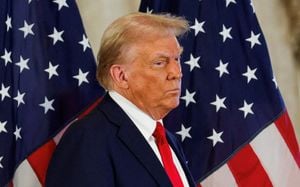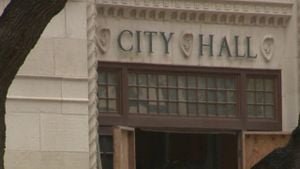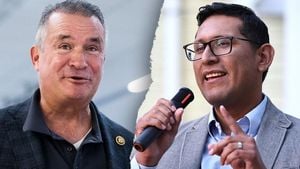San Francisco has officially turned the page on its recent mayoral chapter, welcoming Daniel Lurie as the city’s new leader following his surprising victory over incumbent London Breed. A philanthropist with no prior governorship experience, Lurie’s entry onto the political scene raises questions about his governance style and plans for the city.
On paper, Lurie’s existence hails from prominence and wealth. He is the heir to the Levi Strauss fortune and the founder of Tipping Point Community, a nonprofit aimed at alleviating poverty and homelessness. With his connections to San Francisco's elite, dreams of revitalizing the city loom large. But the real test for Lurie is not merely winning the election; it’s how he plans to govern.
His platform tackled many of San Francisco’s longstanding issues. Drug-related crises, high costs of living, and homelessness stand as poignant voters' concerns. With Lurie about to take the helm on January 8, 2025, he insists he intends to declare a state of emergency over the fentanyl crisis from day one. "We have to send the message — San Francisco is no longer a place where you come to deal or do drugs," Lurie stated, making it clear his approach would be multifaceted, combining compassion with decisive action.
Daniel's agenda doesn’t stop there. His intent to host tech leaders in his transition team, including OpenAI’s Sam Altman and former Twitter CFO Ned Segal, signifies his goal of engaging the tech community to tackle urban dilemmas. San Francisco's recent economic struggles, largely attributed to the pandemic, demand innovative solutions and contributions from its business powerhouses. Lurie affirmed, "We need to build more mental health and drug treatment beds" and suggested the necessity of drawing experts from various sectors to re-engage with city projects.
Interestingly, Lurie plans to finance around 75% of his ambitious five-year, $175 million homelessness plan through private donations, tapping the deep pockets of his affluent neighbors. This marks both hope and apprehension. While his wealth might provide access to necessary resources and expertise, ethics experts caution about potential influence from these donors. Craig Holman, from the advocacy group Public Citizen, points out the need for clear separation between private funding and government operations to maintain integrity.
“If he can set up boundaries so private donors don’t have business before the city, it could provide a balanced way to utilize donor funds,’' Holman stated. Conversely, Sean McMorris from California Common Cause warned about the risks of creating dependencies on private funding as it might create opportunities for those with wealth to exert influence over government decisions.
Lurie’s administration will also need to navigate the city’s notoriously convoluted bureaucracy. He has pledged to overhaul technical infrastructure affecting hiring and housing approvals, common complaints from San Francisco residents and businesses alike. His focus on hiring well-versed professionals to oversee operations suggests he understands the bare essentials for ensuring functional governance.
The future mayor's strategy reflects broader shifts happening within the state of California itself, which sees voters increasingly leaning away from progressively liberal policies to more centrist approaches. This trend is underscored by the recent recall efforts against prominent officials and the election of more conservative leaders at local levels. Lurie aims to capitalize on this mood, emphasizing the need for practical governance grounded in addressing immediate quality-of-life issues over ideological battles.
“What we have done with this election is get back to common sense,” said Lurie, contesting claims of the city shifting away from progressive ideals. “It’s about getting results for the people of San Francisco.”
To enact his vision for San Francisco’s comeback as the top American destination for business, Lurie also plans on addressing affordable housing shortages, since attracting talent to the city hinges on the city’s ability to provide livable amenities. Weaving another layer of complexity, he cites upcoming high-profile events like the NBA All-Star Game and the Super Bowl as chances to rejuvenate local pride and economic activity.
Despite Lurie’s clear ambitions, he carries the weight of expectations from both voters and peers. His critics highlight concerns surrounding his lack of political experience and whether his wealth might isolate him from the average San Franciscan’s concerns. Nonetheless, his substantial financial backing allowed him to outpace competitors—his campaign reportedly raised over $16 million, resulting in one of the most expensive races the city has seen.
Yet, winning is just the first act. Now, Lurie's real challenge begins: manifesting his campaign proclamations and guiding San Francisco through difficult waters. Critical voices from the community will undoubtedly watch closely to see if his promises translate effectively.
His victory over Breed demonstrates the public's readiness for change, but without successful governance, Lurie’s administration may be destined to be another blip on San Francisco’s tumultuous political map. It seems the coming year will showcase whether Lurie can go from mayor-elect to mayor who truly delivers. A city grappling with identity, safety, and community support waits to see if its new leader can concert these aspirations with action.
Indeed, there's hope within the air of change, and the direction will prove pivotal as San Francisco begins to heal its wounds and reclaim its reputation.
With looming uncertainties and high expectations, the stage is set for Lurie to prove not just whether he can lead but how well he can navigate the intricacies of city governance and address the pressing needs of all its citizens.



